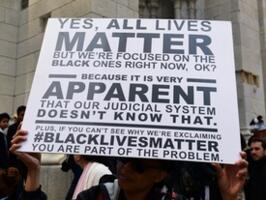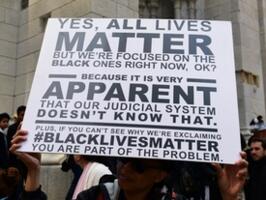50% Say Race Relations in America Getting Worse
Confidence in race relations in America continues to fall, with hopes for the future at their lowest level yet.
A new Rasmussen Reports national telephone survey finds that 50% of American Adults now think race relations in this country are getting worse, up from 44% a year ago and 30% as recently as January 2014. Only 20% believe race relations are getting better, a new low that compares to 38% five years ago. Twenty-six percent (26%) say race relations are staying about the same. (To see survey question wording, click here.)
Only 18% rate race relations in America today as good or excellent, unchanged from last year at this time but down from 34% two years ago. Thirty-three percent (33%) now consider race relations poor, up from 15% in 2011 and 29% last January.
Interestingly, unlike most questions related to race, there isn’t a wide difference of opinion on these questions between blacks and whites. Other minority Americans are the least pessimistic.
But blacks are much more likely than whites and other minorities to believe the United States is headed in the right direction.
(Want a free daily e-mail update? If it's in the news, it's in our polls). Rasmussen Reports updates are also available on Twitter or Facebook.
The survey of 1,000 American Adults was conducted on January 14 and 17, 2016 by Rasmussen Reports. The margin of sampling error is +/- 3 percentage points with a 95% level of confidence. Field work for all Rasmussen Reports surveys is conducted by Pulse Opinion Research, LLC. See methodology.
Views of Martin Luther King Jr. Day haven’t changed, but even after seven years of having the first black president in office, Americans are more dubious than ever that King’s dream of equal opportunity has been achieved. Blacks are the most skeptical.
Eighty-one percent (81%) of all Americans continue to believe the term “discrimination” refers to any discrimination of people of one race against another. Just 13% think it only refers to discrimination by white people against minorities. This is unchanged from 2013 when Rasmussen Reports first asked this question.
However, nearly one-in-four blacks (23%) think “discrimination” refers only to discrimination by white people against minorities, a view shared by just 11% of both whites and other minority adults.
Men and women are in general agreement about race relations in America and what the future holds.
Adults of all ages agree about the current state of race relations. Those under 40 are less likely than their elders to think those relations are getting worse, but they aren’t overly optimistic.
Sixty-six percent (66%) of Republicans and 50% of voters not affiliated with either major party believe race relations are getting worse. Among Democrats, just 37% agree, while 25% say they are getting better.
Americans hoped the election of the first black president in 2008 would help heal the racial division that has plagued this country for much of its history, but a plurality (47%) of voters thinks Barack Obama has driven those of different races further apart instead.
At the end of 2014, only eight percent (8%) of voters believed race relations had gotten better since Obama’s election in 2008, and blacks and whites didn’t disagree much.
Eighty-two percent (82%) of black voters think most black Americans receive unfair treatment from the police. White voters by a 56% to 30% margin disagree. Other minority voters are evenly divided.
But 70% of all voters believe the level of crime in low-income inner city communities is a bigger problem in America today than police discrimination against minorities.
Fifty-eight percent (58%) think there is a war on police in America today. Sixty percent (60%) believe comments critical of the police by some politicians make it more dangerous for police officers to do their jobs.
Only 17% believe politicians raise racial issues to address real problems. Seventy percent (70%) think they talk race just to get elected.
Additional information from this survey and a full demographic breakdown are available to Platinum Members only.
Please sign up for the Rasmussen Reports daily e-mail update (it’s free) or follow us on Twitter or Facebook. Let us keep you up to date with the latest public opinion news.
The survey of 1,000 American Adults was conducted on January 14 and 17, 2016 by Rasmussen Reports. The margin of sampling error is +/- 3 percentage points with a 95% level of confidence. Field work for all Rasmussen Reports surveys is conducted by Pulse Opinion Research, LLC. See methodology.
Rasmussen Reports is a media company specializing in the collection, publication and distribution of public opinion information.
We conduct public opinion polls on a variety of topics to inform our audience on events in the news and other topics of interest. To ensure editorial control and independence, we pay for the polls ourselves and generate revenue through the sale of subscriptions, sponsorships, and advertising. Nightly polling on politics, business and lifestyle topics provides the content to update the Rasmussen Reports web site many times each day. If it's in the news, it's in our polls. Additionally, the data drives a daily update newsletter and various media outlets across the country.
Some information, including the Rasmussen Reports daily Presidential Tracking Poll and commentaries are available for free to the general public. Subscriptions are available for $4.95 a month or 34.95 a year that provide subscribers with exclusive access to more than 20 stories per week on upcoming elections, consumer confidence, and issues that affect us all. For those who are really into the numbers, Platinum Members can review demographic crosstabs and a full history of our data.
To learn more about our methodology, click here.






